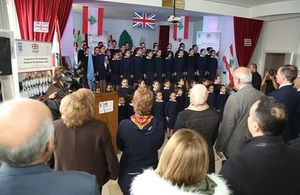UKAid support to agricultural in the Bekaa
British Ambassador Hugo Shorter inaugurated four projects in Bekaa part of the Lebanon Host Communities Programme.

Hadanet El Tofl Orphanage Zahle, children singing the anthem
As part of the UK’s ongoing partnership with the Ministry of Social Affairs, British Ambassador Hugo Shorter returned to the Bekaa to inaugurate four additional UK funded projects under the Lebanon Host Communities Support Programme, a close partnership between the Ministry of Social Affairs and the United Nations Development Programme.
Ambassador Shorter inaugurated the construction and rehabilitation of agricultural roads, bridges and road networks in Taalabaya and Saadnayel, to enable farmers to access their lands and decrease the cost of transportation. These projects have benefitted over 14,000 commuters, 800 farmers and agricultural workers in both areas.
He also inaugurated the rehabilitation of Zahle’s only orphanage Hadanet al Tofl, allowing girls to have a much safer environment in which to study and live. The projects were chosen through the Maps of Risks and Resources consultation process, set by the community and local people in the Bekaa, in coordination with the Ministry of Social Affairs and UNDP.
He was accompanied by the mayors of Zahle, Taalabaya and Saadnayel, Mr Assad Zogheib, Mr George Sawwan and Mr Khalil Shehimi respectively; as well as the National Coordinator of the Lebanon Host Communities Support Programme at the Ministry of Social Affairs, Mrs Suheir El Ghali. UNDP Officer in Charge - Regional Bureau for Arab States, Ms. Sophie de Caen also accompanied the visit.
Following a warm welcome from the children at the orphanage who performed the Dabke, Ambassador Shorter said:
I am pleased to return to the Bekaa to see our words turned once again into actions. The UK’s commitment to this programme is a result of investment that has grown exceptionally to support vulnerable local communities since 2013. Our support has targeted the municipality’s needs in humanitarian and agricultural sectors, with the latter benefitting thousands of families in this region where agriculture plays a large part in the economy. We are also supporting many other projects in the region, for example, work with Mercy Corps’ INTAJ programme delivering waste management and job creation projects through skills training and support to small and medium sized enterprises. As a result over 250 jobs have been found or created so far in the Bekaa and North Lebanon.
Lebanon is the 2nd largest recipient of UK aid in the Middle East, the second largest recipient of UK aid per head in the world, and our total support to Lebanese stability, prosperity and security has reached £436m since 2011.
UNDP Officer in Charge - Regional Bureau for Arab States, Ms. Sophie de Caen, said:
It is the host municipalities that are at the forefront of the response efforts struggling to assure the wellbeing of their own citizens and support the refugees in both humanitarian and livelihood needs. For that, we salute the generosity shown by the Lebanese population and of the local Municipalities, particularly in the Bekaa region that is hosting the highest number of refugees in Lebanon with a population increase of 67%.
The challenges faced today in responding to this unprecedented regional crisis are huge and it is only by coming together under frameworks such as Host Communities Programme that we can hope to meet them. We at UNDP are committed to this partnership and I would like to take this opportunity to thank other key actors”, she added.
National Coordinator of the Lebanon Host Communities Support Programme at the Ministry of Social Affairs, Mrs Suheir El Ghali said:
We believe in supporting the local administrations and institutions and their resilience in the face of these challenges, and in strengthening local social stability. That is why we have implemented these different projects which include the rehabilitation of Hadanat al Tofl where are gathered here today, the construction of agricultural roads, the rehabilitation of two bridges in Saadnayel, and the construction of the agricultural road in Taalbeya.
These projects have been identified through the Maps of Risks and Resources (MRR) methodology adopted by the Lebanon Host Communities Support Project, and are funded by UK DFID and implemented by MoSA teams. The MRR is a participatory approach that involves local stakeholders and communities and representatives from municipalities in identifying problems and prioritizing needs, finding solutions, and producing multi-sectorial municipal action plans.
The mayor of Zahle Mr Assad Zogheib said:
Hadanet l Tofol” Orphanage Director, Mrs. Amal Ayoub said “With the sudden deterioration of economic conditions and increase in poverty, social cases became numerous in Zahle, we saw great poverty and deprivation spread in our community, and in many cases families separated, which left children without a home that can provide for them.
Under these circumstances it is worth noting that Hadanet Al-Tofl is since it was founded in 1948, the only institution capable of gathering these children from different religious backgrounds and circumstances under its roof, where they can continue their education in an environment that preserves social cohesion in our area.